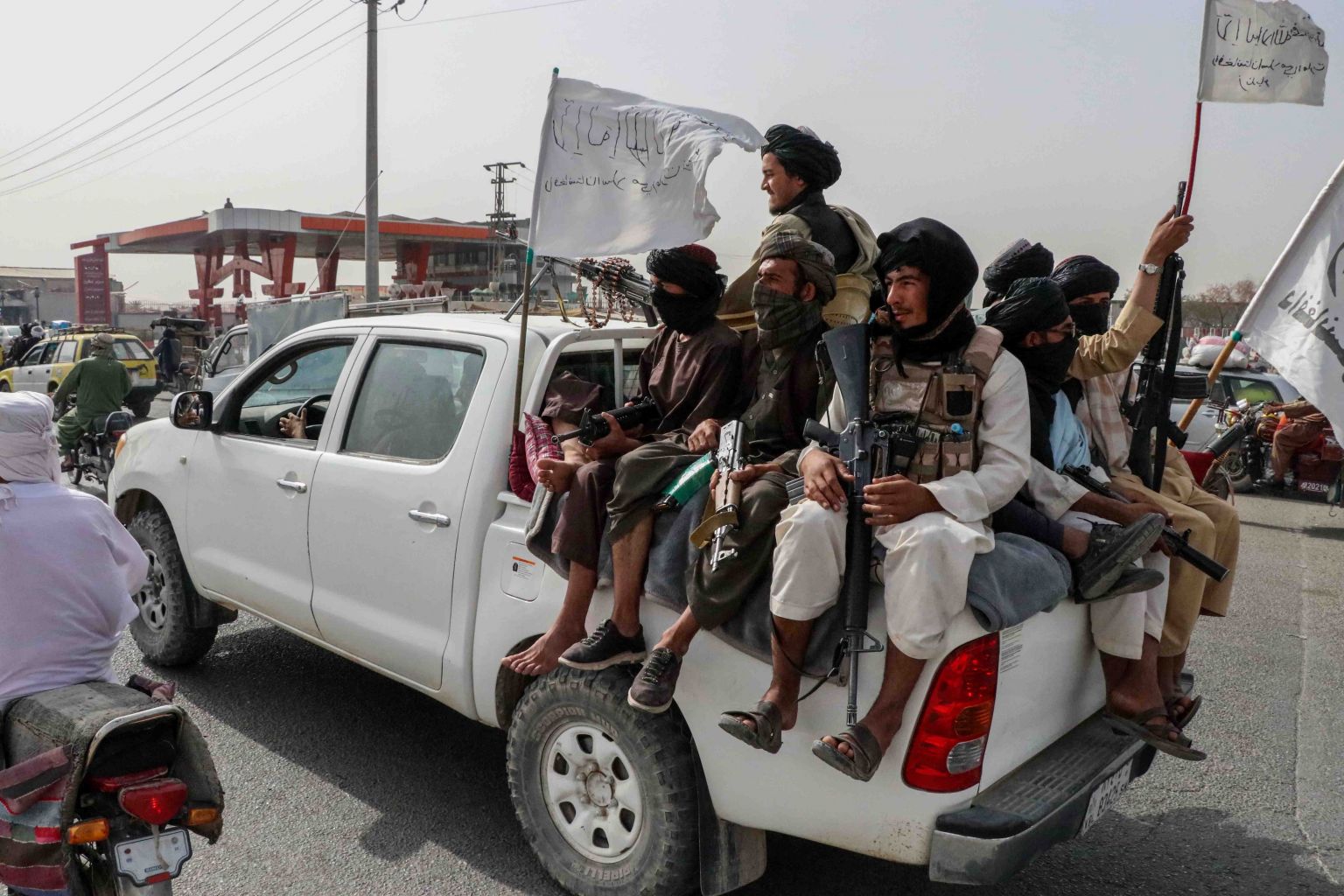Taleban vows no haven for terrorists in Afghanistan, in break with own past
Sign up now: Get insights on Asia's fast-moving developments

Taleban fighters patrol in Kandahar, Afghanistan, on Aug 17, 2021.
PHOTO: EPA-EFE
Follow topic:
KABUL (BLOOMBERG) - The Taleban said it would build an inclusive government, protect the rights of women "within the bounds of syariah law," and prevent Afghan territory from being used to target any other country after sweeping aside the Western-backed government to end two decades of war.
"We assure the international community and especially the US and neighbouring countries that Afghanistan won't be used against them," Taleban spokesman Zabihullah Mujahed said in Kabul on Tuesday (Aug 17), making his first fully public appearance after 20 years spreading the group's message from secret locations as it fought Nato and Afghan forces.
His comments addressed deep fears in Afghanistan and overseas that the Taleban's return to power will in particular roll back advances in the freedoms enjoyed by some women, and allow terrorist groups like Al-Qaeda to rebuild a base in the country.
Convincing the world that the Taleban intends to be true to its word will be key if the group hopes to gain at least tacit recognition from the US and its allies as the new rulers of Afghanistan.
Taleban say women can work, shifting from pre-9/11 stance
"After consultations we will witness the formation of a strong inclusive Islamic government," Mujahed said, dodging questions of who would lead the country. He added that a Taleban-run Islamic Emirate of Afghanistan wouldn't seek retribution against those who worked with the US and the ousted administration or fought the movement.
"All of them have been pardoned," he said during a more than hour-long press conference, dressed in the Taleban's usual black turban. Mujahed said the group's fighters would collect weapons in a country awash with guns, and crack down on opium production.
He sat in front of a cluster of microphones, and a hand sanitiser bottle, with the white Taleban flag and blue velvet curtains behind him. A translator sat to his left, often leaning in to translate questions from the foreign press or to relay his answers. It was the first time that people had seen Mujahed with his face uncovered.
The Sunni fundamentalist movement, which took power as the US-trained Afghan army melted away and President Ashraf Ghani fled his palace, has previously suggested it won't revert to some of the harsh practices it followed when in power before the Sept 11, 2001, attacks.
But many are deeply sceptical that the Taleban charm offensive represents a shift in its fundamentalist rule. Already reports have emerged of forced marriages, discrimination against female employees and orders for men to grow beards. Thousands of residents have fled to neighbouring countries in an attempt to escape life under the insurgents.
Earlier Tuesday, Taleban representatives, Afghan officials and leaders in Qatar - where the two sides held now-stalled peace talks - were thought to have begun discussions in an effort to formalise the transition of power.
Baradar arrival
Details of the meetings were sketchy and later a senior Taleban delegation led by deputy chief Mullah Abdul Ghani Baradar, tipped by some observers to be Afghanistan's next leader, flew from the Qatari capital of Doha to Kandahar, the southern Afghan city that was the austere movement's stronghold when it previously ruled over the country.
Kabul was reported to be largely calm. US forces restored security at the capital's Hamid Karzai International Airport, where some military evacuation flights resumed as nations withdraw their personnel.
Al Jazeera said the airport would reopen to civilians on Saturday, citing an unidentified security official. German defence officials said for now the militant group had sealed off the facility and was only letting through members of the international community.

A 2020 photo shows Taleban co-founder Mullah Abdul Ghani Baradar speaking at a signing ceremony of the US-Taleban peace deal in the Qatari capital Doha.
PHOTO: AFP
In its five-year rule from 1996 until the 2001 US invasion triggered by the Sept 11 attacks, the Taleban ruled Afghanistan under an extremely conservative interpretation of syariah law.
Women were banned from working outside their homes and attending schools or colleges, required to have a male escort if they went out in public, and were expected to wear a burqa - a garment that covers the full face and body. Punishments for non-compliance included public stonings and executions.
Earlier on Tuesday, another Taleban official, who asked not to be identified due to the group's rules for speaking to the media, said that now women would be allowed to work "where they so choose" in government, the private sector, trade and elsewhere, as long as they abided by Islamic regulations.
The Taleban had also made previous promises of security and an "amnesty" for all government officials and employees since its fighters entered Kabul.
The desperate search for a way out of Afghanistan by the crowds that surged into Kabul's airport Monday, with some clinging to departing aircraft, showed many will take a lot of convincing.

